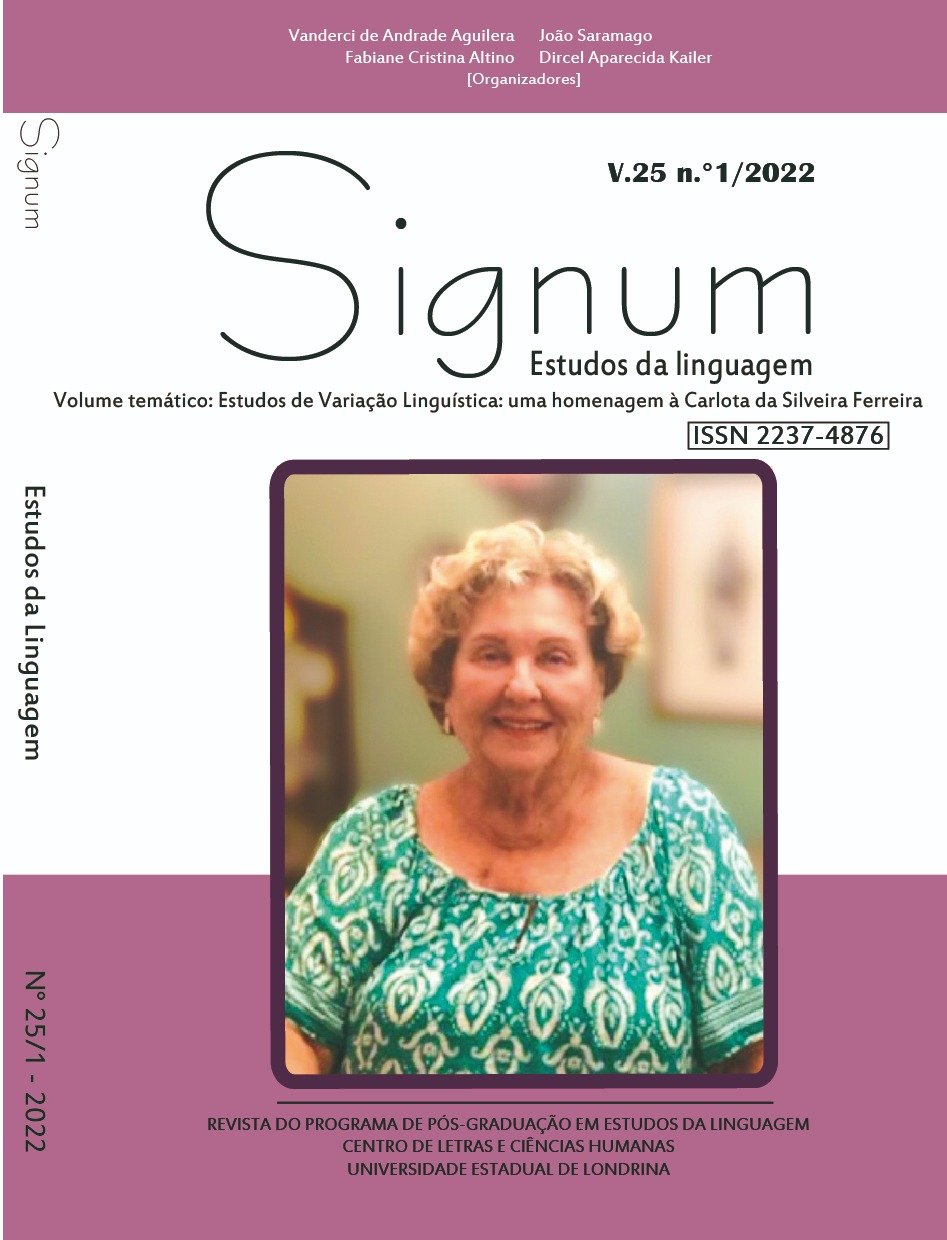Variation of Verbal Agreement in Speech from North Paraná People
DOI:
https://doi.org/10.5433/2237-4876.2022v25n1p52Keywords:
Verbal agreement, Spoken language, Variationist sociolinguisticsAbstract
Normative grammars, almost invariably, state that verb agreement occurs once the verb inflects and conforms to the number and person of the subject. In speech, however, it happens that this linguistic phenomenon does not occur homogeneously and only in accordance with the rules prescribed by these grammars (according to CASTILHO, 2016; SCHERRE; NARO, 1998; VIEIRA, 2013). The marking or not of verbal agreement can occur motivated by factors that go beyond the linguistic. The present work, based on the Variationist Sociolinguistics methodology, examined the variation of verb agreement in speech from North Parana people. For the analysis, the extralinguistic factors: gender, age group and education level. And the linguistic factors degree of phonic salience and position of the subject in relation to the verb were observed as possible conditioners of the phenomenon under study. The research corpus consists of sixteen interviews with informants from North Parana belonging to the database of interviews recorded and transcribed by Botassini (2013). After the analysis, it was found that the linguistic factor position of the subject in relation to the verb and the extralinguistic factors gender and education level were the most determinant for the marking or not of verbal agreement.
References
ALKMIM, Tânia Maria. Sociolinguística. In: MUSSALIM, Fernanda; BENTES, Anna Christina. (org.). Introdução à linguística: domínios e fronteiras. 7. ed. São Paulo: Cortez, 2007. v. 1, p. 21-47.
AZEREDO, José Carlos de. Gramática Houaiss da Língua portuguesa. São Paulo: Publifolha, 2013.
BECHARA, Evanildo. Moderna gramática brasileira. 37. ed. Rio de Janeiro: Nova Fronteira, 2009.
BOTASSINI, Jacqueline Ortelan Maia. Crenças e atitudes linguísticas: um estudo dos róticos em coda silábica do norte do Paraná. 2013. 219 f. Tese (Doutorado em Estudos da Linguagem) - Universidade Estadual de Londrina, Londrina, 2013.
CAMACHO, Roberto Gomes. Aspectos funcionais e estruturais da concordância verbal no português falado. Alfa, São Paulo, v. 37, p. 101-116, 1993. Disponível em: https://www.researchgate.net/publication/268047679_Aspectos_funcionais_e_estruturais_da_concordancia_verbal_no_portugues_falado. Acesso em: 30 dez. 2018.
CAMACHO, Roberto Gomes. Sociolinguística: parte II. In: MUSSALIM, Fernanda; BENTES, Anna Christina. (org.). Introdução à linguística: domínios e fronteiras. 7. ed. São Paulo: Cortez, 2007. v. 1, p. 49-75.
CASTILHO, Ataliba T. de. Nova gramática do português brasileiro. São Paulo: Contexto, 2016.
CEGALLA, Domingos Paschoal. Novíssima gramática da língua portuguesa. 48. ed. São Paulo: Companhia Editora Nacional, 2008.
COULTHARD, Malcolm. Linguagem e sexo. Tradução de Carmem Rosa Caldas-Coulthard. São Paulo: Ática, 1991.
CUNHA, Celso Ferreira da; CINTRA, Luís Filipe Lindley. Nova gramática do português contemporâneo. 7. ed. Rio de Janeiro: Lexikon, 2017.
DUARTE, Maria Eugênia Lamoglia. Sujeito nulo/pleno e marcas de concordância. In: VOTRE, Sebastião Josué; RONCARATI, Cláudia (org.). Antohy Julius Naro e a linguística no Brasil: uma homenagem acadêmica. Rio de Janeiro: 7letras, 2008. p. 265-277.
GALVES, Charlotte C. O enfraquecimento da concordância no português brasileiro. In: ROBERTS, Ian; KATO, Mary A. (org.). Português brasileiro: uma viagem diacrônica. Campinas: Ed. da Unicamp, 1993. p. 387-408.
MOLLICA, Maria Cecília. Fundamentação teórica: conceituação e delimitação. In: MOLLICA, Maria Cecília; BRAGA, Maria Luíza (org.). Introdução à sociolinguística: o tratamento da variação. São Paulo: Contexto, 2008. p. 9-14.
PAIVA, Maria da Conceição de. A variável gênero/sexo. In: MOLLICA, Maria Cecília; BRAGA, Maria Luíza (org.). Introdução à sociolingüística: o tratamento da variação. São Paulo: Contexto, 2003. p. 33-42.
SCHERRE, Maria Marta Pereira; NARO, Anthony Julius. Sobre a concordância de número no português falado do Brasil. In: CONGRESSO INTERNAZIONALE DI LINGUISTICA E FILOLOGIA ROMANZA, 21., 1998. Palermo, Italy. Tübingen: Max Niemeyer Verlag, 1998. v. 5, p. 509-523. Tema: Dialettologia, geolinguistica, sociolinguistica. DOI: https://doi.org/10.1515/9783110934038.509
TARALLO, Fernando. A pesquisa sociolinguística. 7. ed. São Paulo: Ática, 2002.
VIEIRA, Silvia Rodrigues. Concordância verbal. In: VIEIRA, Silvia Rodrigues; BRANDÃO, Silvia Figueiredo F. (org.). Ensino de gramática: descrição e uso. 2. ed. São Paulo: Contexto, 2013. p. 85-102.
VOTRE, Sebastião Josué. Relevância da variável escolaridade. In: MOLLICA, Maria Cecilia; BRAGA, Maria Luíza (org.). Introdução à sociolingüística: o tratamento da variação. São Paulo: Contexto, 2003. p. 51-57.
Downloads
Published
How to Cite
Issue
Section
License
Copyright (c) 2022 Signum: Estudos da Linguagem

This work is licensed under a Creative Commons Attribution-NonCommercial-NoDerivatives 4.0 International License.
This journal reserves the right to make, in the originals, normative, orthographic and grammatical modifications in order to maintain the standard language and the credibility of the publication. It will respect, however, the authors’ style of writing. Modifications, corrections and suggestions of conceptual order will be forwarded to the authors, if necessary. In these cases, the papers, once appropriate, should be submitted to a new appreciation. The final examinations will not be forwarded to the authors. Works published become property of Signum, being its total or partial reprint subject to an explicit authorization of the journal. In all subsequent quotes the original source of publication should be mentioned, in case, in Photographic Discourse. Opinions emitted by the authors are their exclusive responsibility.















